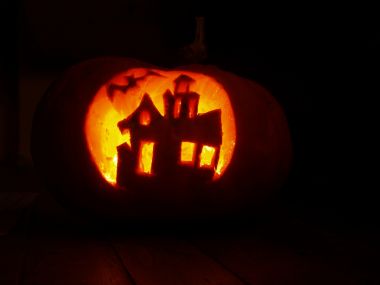Five things evangelicals get wrong about Halloween

Imagine the scene. A pitch-black night. Half a dozen semi-feral kids, dressed to terrify. A old lady in a phone box. The pack of assorted ghouls hidden in bushes around it, waiting to jump out and scare the liver out of her when she'd finished.
It's the dark side of Halloween, all right, that and the whole occult thing.
I confess: I was one of them. I remember feeling very daring in my white sheet with holes cut in it for eyes (I assume I had asked my mother for permission). I also remember the growing sense of unease as the old lady stayed on the phone and the whispered discussions among the rustling leaves. Had she seen us? Was she too scared to come out? Could she be calling the police?
We were not cut out for villainy. We stood up sheepishly and apologised to her when she emerged. She was very gracious and asked if we did anything on Sunday afternoons. No, we said, too demoralised for quick thinking; and so it was that my brothers and I joined a small Brethren assembly at four o'clock every Sunday for the next few years.
Every year, at about this time, there's a outbreak of evangelical hysteria about Hallowe'en. All that stuff about witches and ghosts, and the more fashionable zombies – it can't be healthy, surely? So we claim that it 'celebrates evil', we manufacture worries about children being out by themselves in the dark knocking on strange doors, and run Light Parties instead which are terrifically cheerful. There's nothing at all wrong with Light Parties; my own church is doing one. But here's why I think evangelical churches have got things a bit wrong.
1. They're buying into superstition. If anyone really does think that the Devil is particularly present in a pair of plastic horns and a trident, or a set of detachable vampire fangs, or a tube of fake blood, they have a truly limited conception of the power of evil and should get out more. Evil is much more serious than that. Just turn on the TV news and look at the latest bulletin from Syria.
2. They don't get irony. Repeat: It's not real. Hallowe'en is a marketing opportunity for people who sell pumpkins. It is based on mediaeval myths and modern horror films. Taking it seriously as a sort of spiritual onslaught by the forces of darkness is to confuse fiction and fact. The Devil has better things to do – or, as it might be, worse – than waste time on silly stories.
3. They don't let children imagine. Learning to laugh at the dark is a valuable lesson in life. We don't generally like the dark, an animal reaction going back to very primitive times when it usually held something out to get you. But dark stories which we know will end happily; dark characters which we know are really our mate with a plastic bolt through his neck; eyeballs which bounce off the walls because they're actually made of rubber – all of these things help teach us courage. Insisting that life is candy floss and only candy floss doesn't really help anyone.
4. They're putting another barrier between church and culture. Now, I'm all for that when it's necessary. If we looked like everyone else there's be no point in being us. And there are things about Hallowe'en I'd like to challenge. I'm fine with witches and ghosts, much less so with serial killers. I think challenging it by moderating it rather than rejecting it is a better approach.
5. They don't believe in the power of God. Even if Hallowe'en were genuinely spooky and on that one night the devils in hell came out to do their worst – so what? If I am not mistaken, God gives us the victory through our Lord Jesus Christ (1 Corinthians 15: 57); there is really nothing to worry about.
Celebrating Hallowe'en the old-fashioned way never did us any harm. Worrying too much about it being a gateway to evil influences just might. In our own case, after all, it was a gateway to a Brethren Sunday school.
Follow @RevMarkWoods on Twitter.











